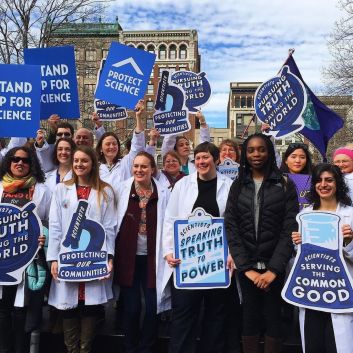I gave these remarks at the Rally to Stand Up for Science today in Copley Square, to a crowd of several thousand scientists and science supporters. We had a wonderful, diverse group of speakers, which was so refreshing. I encourage others to post their remarks, because they were so wonderful. We all had different touchstones, and I wanted to talk about why science for the people means so much to me. One thing that was interesting was realizing that writing for speaking is very different from writing for reading. I did a lot of editing on the fly because it would sound more natural, for example. I don’t think I even began to communicate what was in my heart, but it’s a start.
Hi. I’m a scientist. But I wasn’t born one. In chemistry, we talk about catalysts — agents of change that help foster reactions. There were two real catalysts that helped me on my path to science. The first was growing up in a military family –my father and stepfather both served in the United States Navy. It turns out, bouncing from place to place as a kid is a great way to instill an early fascination with our planet – everywhere we moved, I encountered new landscapes, new cultures, new climates, and new plants and animals.
After my dads retired, I grew up in rural, working class towns – steel mill towns, and lumber mill towns. The kinds of towns we heard a lot about in the last election. My parents wanted me to go to college, so I could have the opportunities they’d never had. Because of them, I grew up knowing that higher education could be a pathway to the middle class.

The #RallyForScience stage, including several of the speakers (and me!). Photo by Amber Ying, used with permission.
And I did go to college. My second catalyst came as a student on a field trip to Acadia National Park (can we just take a moment to cheer our National Park Service?). Our National Park system allowed me to have close encounters with nature that changed my life. Standing knee deep in a bog, completely covered in mud, I had the realization that I didn’t just love science, I wanted to do science.
But I didn’t just want to do science for myself. I wanted to do science for everyone. Growing up in a working class family in rural America, I’ve had first-hand encounters with why science matters – to the health of our families, to our clean air and water, and to our industry and infrastructure.
I truly believe that science for everyone is one of America’s best ideas. It’s research that’s largely funded by taxpayers, instead of corporate interests. It’s transparent, accessible, and broadly communicated, not locked behind a paywall. And it’s mandated to be in the national interest. When science is for everyone, it has direct benefits to public health, our economy, and in creating a culture that fosters innovation and discovery, and values education.
When our new director of the Environmental Protection Agency took to Twitter this week, one of the first things he did was to pledge to work with stakeholders: he specifically named industry, farmers, ranchers, and business owners. But he left out the largest group of stakeholders in the country: all of us. Standing up for science for everyone means standing up for those who stand to lose the most as our scientific institutions come under attack.
And I have a secret for you: those people, who have the most to lose? It’s not us scientists. If all climate change funding were to be eliminated tomorrow, yes, I’d be devastated, but my lab would survive. I have so many questions about our incredible planet that I could never hope to answer them all even in thousand lifetimes.
So while yes, standing up for science means supporting funding and our scientific institutions, what it really means is standing up for all of us. Because the real stakeholders in the war on science are our citizens. By standing up for science for everyone, we break down barriers, and we give everyone a chance to benefit from – and contribute to – our discoveries.
Standing up for science may feel scary. These intersections between science and politics may feel new, but they’re not. The outcomes of our research have always extended well beyond the lab or the conference room. Our work has implications to the environment, public health, civil rights, economics, education, and national defense. This means science has always been political. And I believe that this is a feature, not a bug.
The intersections between science and politics are what make our science relevant. But just because science is political does not mean that it’s partisan. When science is for everyone, it transcends boundaries and barriers. It revitalizes our communities even as it energizes our research and gives it meaning.
So when you stand up for science, remember who you’re standing up for. We are people, with heartbeats. And when science is strong, we all thrive, together.
Categories: Commentary Diversity Good Causes
Reblogged this on Piano by Ear and commented:
standing up for science! (sitting down actually, to read this interesting blog…)
LikeLike
Great speech, Jacqueline.
LikeLike
Jacquelyn. I knew where you were headed long before you did. Your fascination for all of life sparkled in your eyes. I am so happy that you had the travel opportunities that I had. I have always said that travel and living in distant lands is the best education there is. You have made me very proud and I have no doubts that jn some way you will change the world for the better.
A Proud Mom
LikeLike
Lovely essay. Right on! Stand up for science!
LikeLike